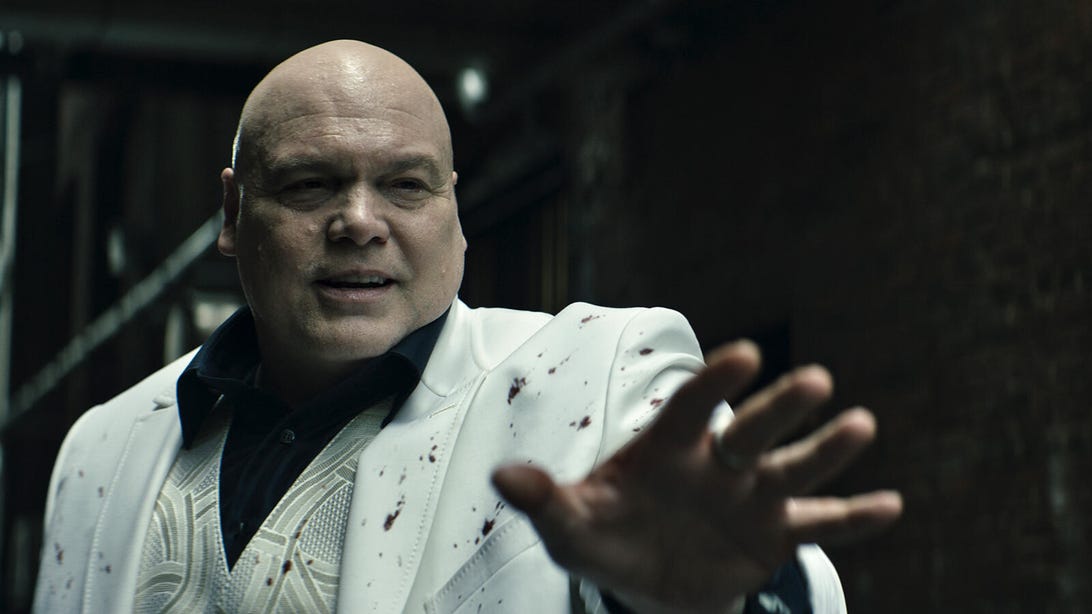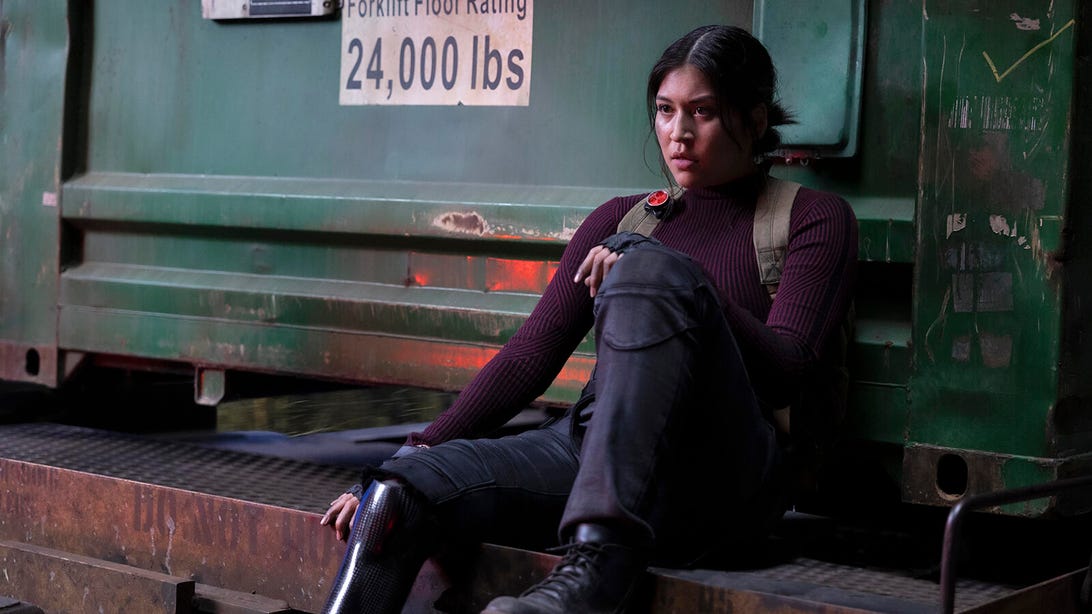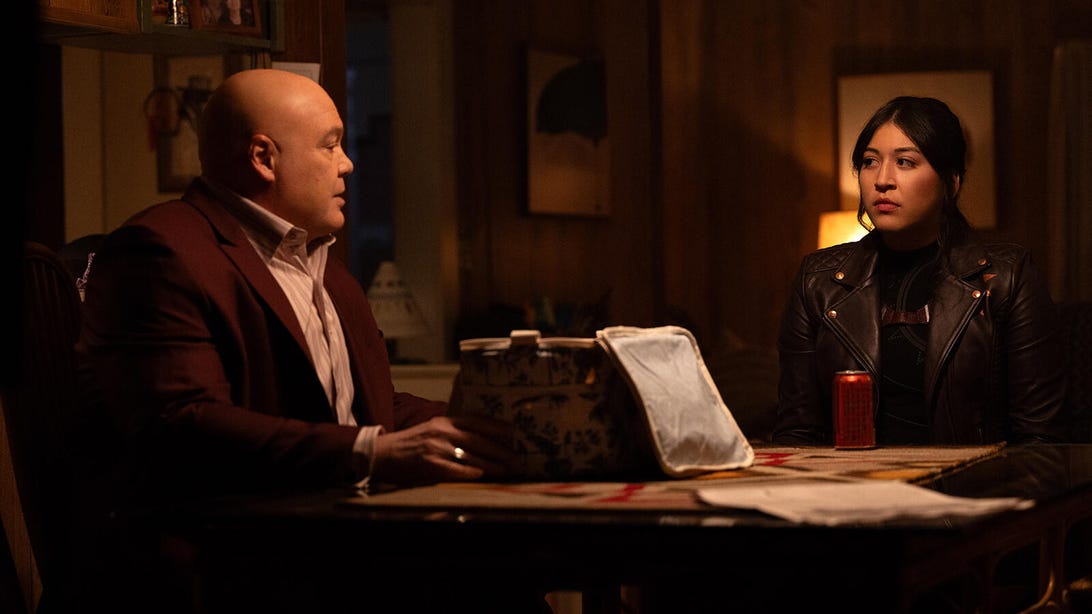Join or Sign In
Sign in to customize your TV listings
By joining TV Guide, you agree to our Terms of Use and acknowledge the data practices in our Privacy Policy.
Marvel's Echo Borrowed Daredevil's Main Villain — and Made Him Even Better
The Disney+ series finds a compelling new angle on Vincent D'Onofrio's volatile Wilson Fisk

Vincent D'Onofrio, Echo
Marvel Studios[Warning: The following contains spoilers for Season 1 of Echo. Read at your own risk!]
Marvel was keen to market Echo as an accessible spin-off for new fans, requiring no prior knowledge of the franchise. In theory, that's a great idea (TV shows shouldn't demand homework!), but in practice, Echo still ties in to several pre-existing storylines. Protagonist Maya Lopez (Alaqua Cox) debuted as a villain in Hawkeye, working for mob boss Wilson Fisk (Vincent D'Onofrio), the main antagonist from Netflix's Daredevil. Echo gives him a more personal — and arguably more interesting — role than before: a toxic mentor who manipulates Maya into a life of crime, isolating her from her family and Native American heritage.
Echo charts Maya's journey from villain to hero, returning to her hometown of Tamaha, Oklahoma, for the first time in 20 years. Raised in a close-knit Choctaw community, she had a happy childhood until her mother's death. After that, Maya and her dad (Zahn McClarnon) moved to New York, where he led one of Fisk's gangs. This transition was a double culture shock because Maya, who is Deaf, was used to living among people who spoke ASL. Hampered by the language barrier, she found solace in martial arts.
As an awkward adult who was once an unhappy child, Fisk saw the young Maya as a kindred spirit, grooming her to become one of his enforcers. The final step in this process was to secretly orchestrate her father's murder, fueling Maya's thirst for revenge — and her capacity to do violence on Fisk's behalf.
Like any good superhero story, Echo emphasizes the parallels between its hero and villain. Fisk and Maya (and indeed Daredevil) were shaped by daddy issues, with Fisk murdering his abusive dad at the age of 12. Neither of them makes friends easily, and Maya — at first, anyway — shares Fisk's lack of moral qualms about homicide.

Alaqua Cox, Echo
Marvel StudiosThroughout the miniseries, Maya is torn between two worlds. Estranged from her extended family, she's initially driven by a desire for revenge, attempting to kill Fisk and sabotage his criminal empire. She's used to thinking like a gangster. But once she reconnects with her relatives in Tamaha, her certainty begins to waver. She starts having visions of her Choctaw ancestors, showing her a different way of life. Yet despite their diverging paths and Maya literally shooting him in the face, Fisk still wants her to rejoin his operation in New York. She is, according to him, his beloved niece.
Echo doesn't try to sell us on a nonviolent moral message. Instead it argues that violence should be used judiciously. Maya is a skilled fighter, and the show revels in her exquisitely choreographed combat scenes. During her ancestral dream sequences, we also meet a lineage of women who protected their communities through various means, including violence. There's a world of difference between their actions and the brutality Maya unleashed on Fisk's behalf, exemplified by the lessons Fisk himself tries to impart.
During a childhood flashback, we see a young Maya (Darnell Besaw) struggle to communicate with a street vendor who mocks her inability to speak aloud. Fisk responds by beating the vendor to a pulp. Rather than being disturbed, Maya kicks the guy in the ribs, something Fisk perceives as evidence that she'd make a good protege. In reality, she's just a messed-up kid whose moral instincts haven't fully formed. Fisk's disproportionate rage may have brought him success as a crime boss, but it's not as aspirational as he likes to believe.
This twisted relationship adds a new dimension to D'Onofrio's earlier role in the MCU — although to be honest, he was always one of the franchise's more interesting villains. With a few exceptions, like Loki (Tom Hiddleston) and Black Panther's Killmonger (Michael B. Jordan), Marvel's live-action supervillains are not notably well-written. That changed with the arrival of Netflix's adult-rated TV spin-offs, which offered meatier screen time to actors like Mahershala Ali, Alfre Woodard, and Vincent D'Onofrio. He and Fisk turned out to be a match made in heaven.
On paper, Wilson Fisk seems pretty straightforward. Representing a familiar crossover between political corruption and organized crime, he's a recurring antagonist for Marvel's New York superheroes. His most distinctive trait in the comics is his looming, outsized physicality, portrayed in Spider-Man: Into the Spider-Verse as an oblong hulk with a tiny head, ten times the size of spindly little Miles Morales. D'Onofrio's broad build and 6'4" height offers a more realistic interpretation, bolstered by shoulder pads as he towers over Daredevil and Maya Lopez.
The rest of Fisk's impact is pure performance, with D'Onofrio embodying the brutal inevitability of a wrecking ball. Contrasting with Daredevil's graceful martial arts, Fisk's early fight scenes in that series involved stuff like slamming a man's head into a car door until the camera panned away in disgust. Eternally volatile, his stilted vocal cadence veers unpredictably from whispers to bellows. This passionate emotionality is why his relationship with Maya Lopez is ultimately more compelling than his criminal vs. crime-fighter dynamic opposite Daredevil.

Vincent D'Onofrio and Alaqua Cox, Echo
Chuck Zlotnick/Marvel StudiosRegardless of whether the two shows are "officially" linked in Marvel canon, Daredevil gives us deeper context for Fisk's sincere yet destructive feelings toward Maya. During his introductory season, he was disarmingly vulnerable, opening up to his future wife Vanessa, who has since vanished somewhere off screen. With no wife or trusted lieutenants mentioned in Echo, he seems desperate for someone to call family. This comes to a head in Episode 4, when Maya goes to confront Fisk and he reveals his tragic backstory, handing her the hammer he used to murder his own father. "I killed him to be free," he says tearfully. "To move forward in my life. So enough games! Here, free yourself. Free me!"
His offer is manipulative on multiple levels. For one, he's likely taking a gamble that Maya won't want to kill him in cold blood. Giving her the hammer is such a bonkers move that it actually defuses the confrontation. At the same time, his offer invites a perverse kind of intimacy. By placing himself in the same role as his abusive father, he alludes to a paternal relationship that doesn't really exist. After all, Maya had a real dad who loved her.
At most, Fisk is a surrogate uncle who later became her boss. And as Maya points out, he never bothered to learn ASL, always delivering orders through an interpreter. He's hungry to be understood, but unlike Maya's ASL-speaking family, he barely attempts to communicate with her on her own terms. His brand of love is selfish, controlling, and possessive. He can't handle Maya rejecting his way of life, so he sets out to sabotage her family reunion, eventually kidnapping her grandmother and cousin.
There's a colonial subtext both in Fisk's behavior toward Maya and in his impact on her hometown. He's a rich white interloper who brings crime and death to the town's Native American community, and when he asks Maya to rejoin him in New York, he's implicitly pressuring her to abandon her Choctaw heritage.
Fisk believes that once he removes her ties to home — a plan that involves attacking a local Powwow full of Choctaw civilians — Maya will return to the fold. He has no conception of her spiritual journey as she reconnects with her roots, because his own sense of culture is all about shallow markers of luxury: expensive wine, minimalist apartments, tailored suits. He's soulless. So while the show's final confrontation is kind of hackneyed (Maya defeats him by forcing him to relive his childhood trauma), it totally works on a thematic level.
Of course, this bout of psychic therapy can't unmake Fisk's calcified personality, so the show bids farewell with an amusingly apt mid-credits stinger. Flying home on his private jet, he catches a news broadcast about New York's mayoral race. The pundits are chatting about the need for an outsider candidate with "bare-knuckle brawler" vibes, foreshadowing his role in next year's Daredevil reboot.
Maya, meanwhile, has found a new path as a community protector, informed by memories of her heroic ancestors. Rather than lingering on guilt and revenge, she's beginning to heal — something that Fisk can never achieve.
Echo Season 1 is now streaming on Disney+ and Hulu.